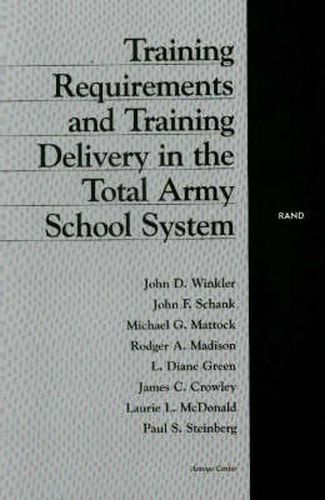Readings Newsletter
Become a Readings Member to make your shopping experience even easier.
Sign in or sign up for free!
You’re not far away from qualifying for FREE standard shipping within Australia
You’ve qualified for FREE standard shipping within Australia
The cart is loading…






This report analyzes the Reserve Components school system’s ability to meet training requirements for noncommissioned officers (NCOs) and for soldiers who are not duty-MOS qualified (DMOSQ), focusing on a prototype reorganized school system in its baseline and execution years (fiscal years 1994 and 1995) and comparing it to the system as a whole. In terms of training NCOs, requirements are large but decreasing and capacity is better able to meet demand; however, utilization of that capacity is inefficient and growing worse, leading to a slight decline in graduates. In terms of DMOSQ training, requirements are decreasing, capacity is increasing, and utilization is improved but still problematic, leading to an increase in graduates. The prototype compares favorably to the system as a whole in both of these areas. The report recommends increased management oversight and new policies to improve the utilization of training capacity throughout the school system. It also recommends the inclusion of new personnel management policies to reduce demands on the training system; e.g., by offering incentives to reduce voluntary job turnover and attrition among DMOSQ soldiers, as much of this turbulence is shown to be driven by personnel, not force structure.
$9.00 standard shipping within Australia
FREE standard shipping within Australia for orders over $100.00
Express & International shipping calculated at checkout
This report analyzes the Reserve Components school system’s ability to meet training requirements for noncommissioned officers (NCOs) and for soldiers who are not duty-MOS qualified (DMOSQ), focusing on a prototype reorganized school system in its baseline and execution years (fiscal years 1994 and 1995) and comparing it to the system as a whole. In terms of training NCOs, requirements are large but decreasing and capacity is better able to meet demand; however, utilization of that capacity is inefficient and growing worse, leading to a slight decline in graduates. In terms of DMOSQ training, requirements are decreasing, capacity is increasing, and utilization is improved but still problematic, leading to an increase in graduates. The prototype compares favorably to the system as a whole in both of these areas. The report recommends increased management oversight and new policies to improve the utilization of training capacity throughout the school system. It also recommends the inclusion of new personnel management policies to reduce demands on the training system; e.g., by offering incentives to reduce voluntary job turnover and attrition among DMOSQ soldiers, as much of this turbulence is shown to be driven by personnel, not force structure.